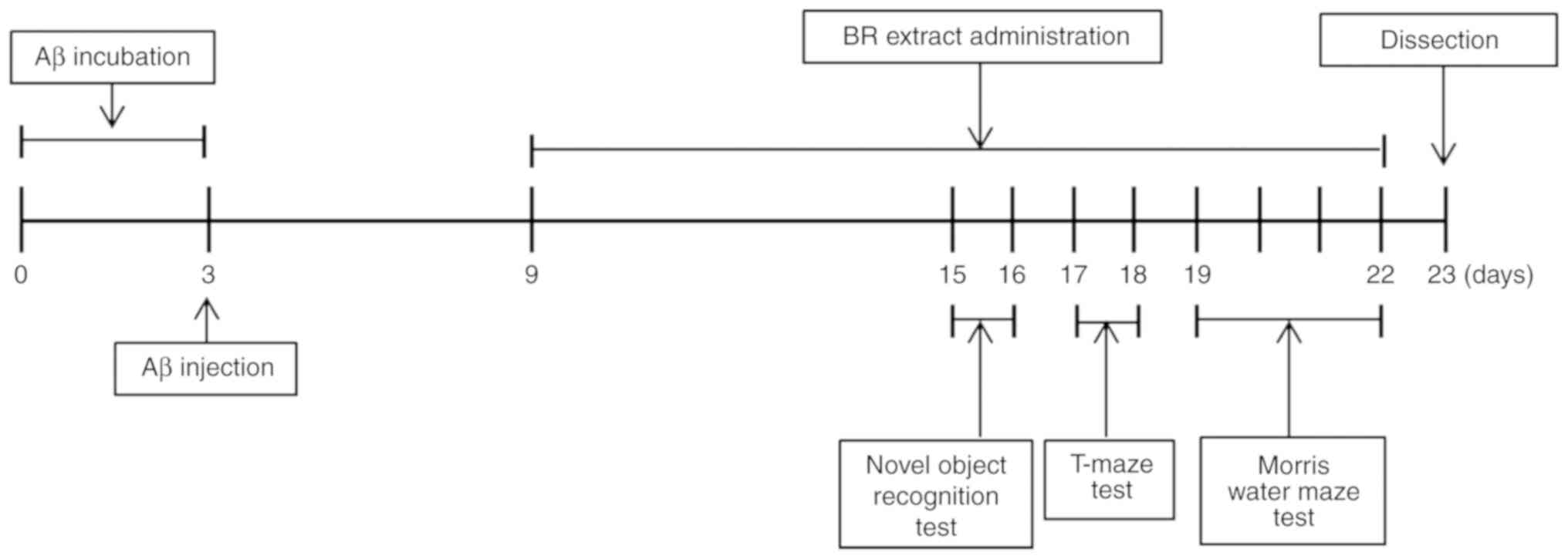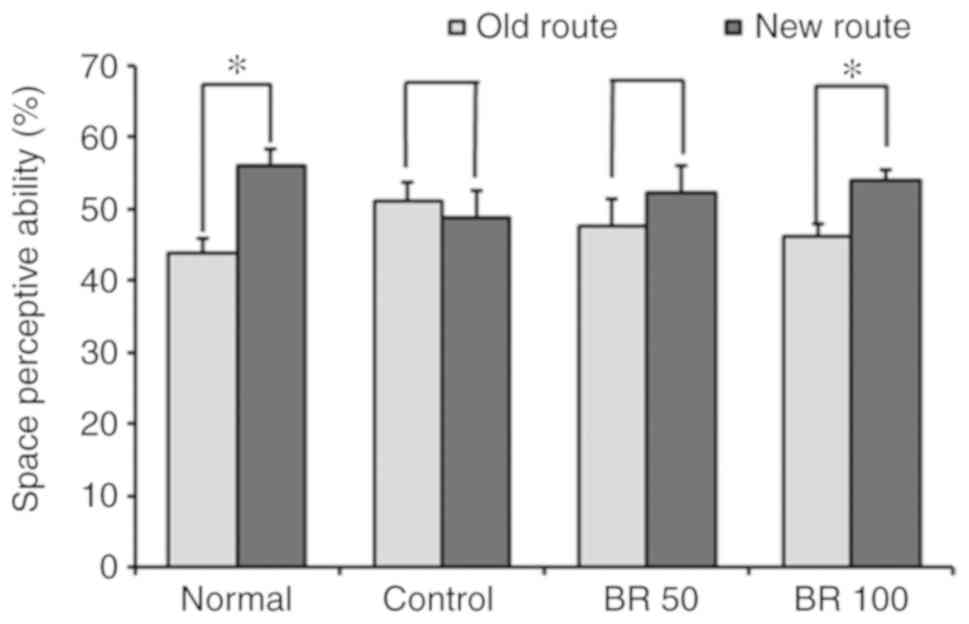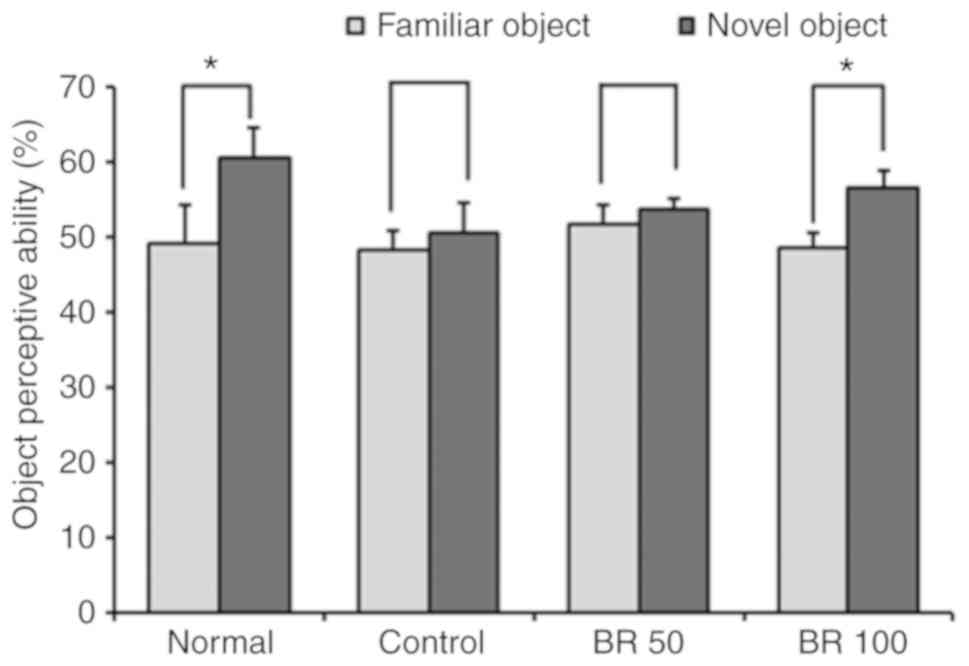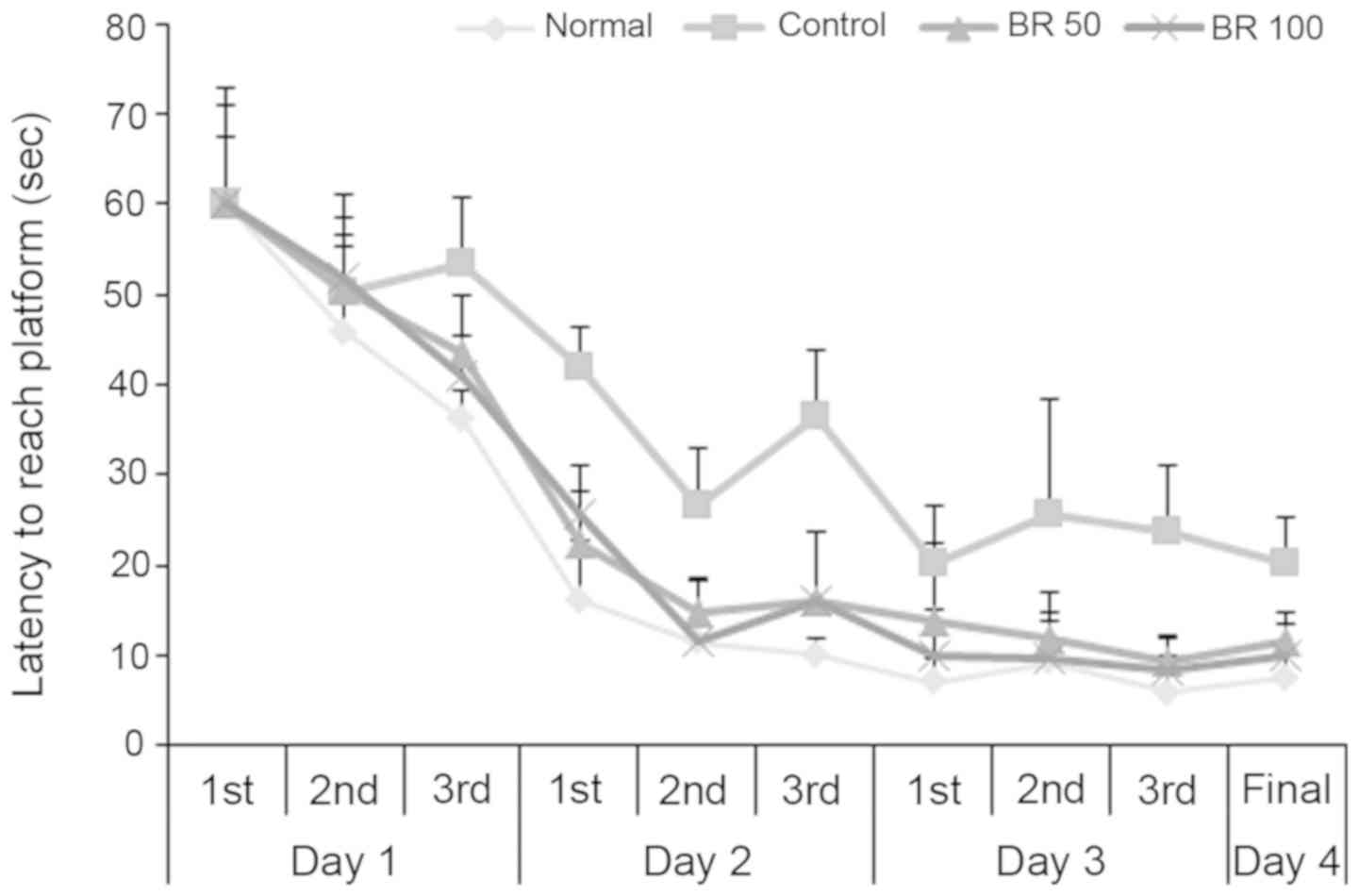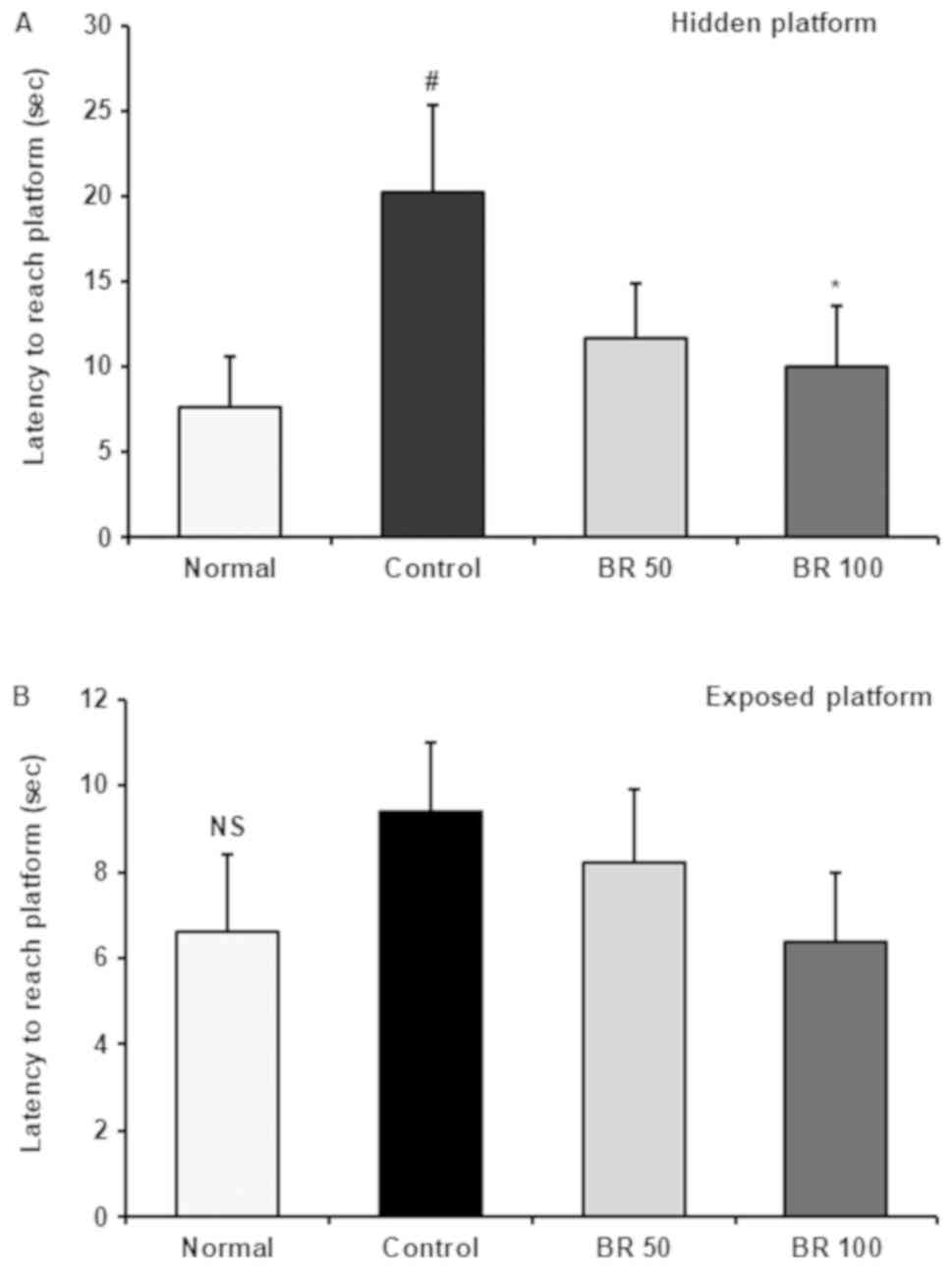|
1
|
Fratiglioni L and Qiu C: Prevention of
common neurodegenerative disorders in elderly. Exp Gerontol.
44:46–50. 2009.PubMed/NCBI View Article : Google Scholar
|
|
2
|
Praticó D: Alzheimer's disease and oxygen
radicals: New insights. Biochem Pharmacol. 63:563–567.
2002.PubMed/NCBI View Article : Google Scholar
|
|
3
|
Maddison DC and Giorgini F: The kynurenine
pathway and neurodegenerative disease. Semin Cell Dev Biol.
40:134–141. 2015.PubMed/NCBI View Article : Google Scholar
|
|
4
|
Selkoe DJ: Soluble oligomers of the
amyloid β-protein impair synaptic plasticity and behavior. Behav
Brain Res. 192:106–113. 2008.PubMed/NCBI View Article : Google Scholar
|
|
5
|
Millucci L, Raggiaschi R, Franceschini D,
Terstappen G and Santucci A: Rapid aggregation and assembly in
aqueous solution of Aβ (25-35) peptide. J Biosci. 34:293–303.
2009.PubMed/NCBI View Article : Google Scholar
|
|
6
|
Pike CJ, Walencewicz AJ, Glabe CG and
Cotman CW: In vitro aging of β-amyloid protein causes
peptide aggregation and neurotoxicity. Brain Res. 563:311–314.
1991.PubMed/NCBI View Article : Google Scholar
|
|
7
|
Dyrks T, Dyrks E, Hartmann T, Masters C
and Beyreuther K: Amyloidogenicity of beta A4 and beta A4-bearing
amyloid protein precursor fragments by metal-catalyzed oxidation. J
Biol Chem. 267:18210–18217. 1992.PubMed/NCBI
|
|
8
|
Reddy PH: Amyloid precursor
protein-mediated free radicals and oxidative damage: Implications
for the development and progression of Alzheimer's disease. J
Neurochem. 96:1–13. 2006.PubMed/NCBI View Article : Google Scholar
|
|
9
|
Valko M, Leibfritz D, Moncol J, Cronin MT,
Mazur M and Telser J: Free radicals and antioxidants in normal
physiological functions and human disease. Int J Biochem Cell Biol.
39:44–84. 2007.PubMed/NCBI View Article : Google Scholar
|
|
10
|
Rubio-Perez JM, Albaladejo MD, Zafrilla P,
Vidal-Guevara ML and Morillas-Ruiz JM: Effects of an antioxidant
beverage on biomarkers of oxidative stress in Alzheimer's patients.
Eur J Nutr. 55:2105–2116. 2016.PubMed/NCBI View Article : Google Scholar
|
|
11
|
Nabavi SF, Braidy N, Orhan IE, Badiee A,
Daglia M and Nabavi SM: Rhodiola rosea L. and Alzheimer's disease:
From farm to pharmacy. Phytother Res. 30:532–539. 2016.PubMed/NCBI View
Article : Google Scholar
|
|
12
|
Kong S and Lee J: Antioxidants in milling
fractions of black rice cultivars. Food Chem. 120:278–281.
2010.
|
|
13
|
Salgado JM, Oliveira AG, Mansi DN,
Donado-Pestana CM, Bastos CR and Marcondes FK: The role of black
rice (Oryza sativa L.) in the control of
hypercholesterolemia in rats. J Med Food. 13:1355–1362.
2010.PubMed/NCBI View Article : Google Scholar
|
|
14
|
Chen XY, Zhou J, Luo LP, Han B, Li F, Chen
JY, Zhu YF, Chen W and Yu XP: Black rice anthocyanins suppress
metastasis of breast cancer cells by targeting RAS/RAF/MAPK
pathway. Biomed Res Int. 2015(414250)2015.PubMed/NCBI View Article : Google Scholar
|
|
15
|
Limtrakul P, Yodkeeree S, Pitchakarn P and
Punfa W: Suppression of inflammatory responses by black rice
extract in RAW 264.7 macrophage cells via downregulation of NF-κB
and AP-1 signaling pathways. Asian Pac J Cancer Prev. 16:4277–4283.
2015.PubMed/NCBI View Article : Google Scholar
|
|
16
|
Chen PN, Kuo WH, Chiang CL, Chiou HL,
Hsieh YS and Chu SC: Black rice anthocyanins inhibit cancer cells
invasion via repressions of MMPs and u-PA expression. Chem Biol
Interact. 163:218–229. 2006.PubMed/NCBI View Article : Google Scholar
|
|
17
|
Jennings A, Welch AA, Fairweather-Tait SJ,
Kay C, Minihane AM, Chowienczyk P, Jiang B, Cecelija M, Spector T,
Macgregor A and Cassidy A: Higher anthocyanin intake is associated
with lower arterial stiffness and central blood pressure in women.
Am J Clin Nutr. 96:781–788. 2012.PubMed/NCBI View Article : Google Scholar
|
|
18
|
Yao SL, Xu Y, Zhang YY and Lu YH: Black
rice and anthocyanins induce inhibition of cholesterol absorption
in vitro. Food Funct. 4:1602–1608. 2016.
|
|
19
|
Sangkitikomol W, Tencomnao T and
Rocejanasaroj A: Antioxidant effects of anthocyanins-rich extract
from black sticky rice on human erythrocytes and mononuclear
leukocytes. Afr J Biotechnol. 9:8222–8229. 2010.
|
|
20
|
Wang LS and Stoner GD: Anthocyanins and
their role in cancer prevention. Cancer Lett. 269:281–290.
2008.PubMed/NCBI View Article : Google Scholar
|
|
21
|
Xia M, Ling WH, Ma J, Kitts DD and
Zawistowski J: Supplementation of diets with the black rice pigment
fraction attenuates atherosclerotic plaque formation in
apolipoprotein E deficient mice. J Nutr. 133:744–751.
2003.PubMed/NCBI View Article : Google Scholar
|
|
22
|
Latagliata EC, Lo lacono L, Chiacchierini
G, Sancandi M, Rava A, Oliva V and Puglisi-Allegra S: Single
prazosin infusion in prelimbic cortex fosteres extinction of
alphetamine-induced conditioned place preference. Front Pharmacol.
8(530)2017.PubMed/NCBI View Article : Google Scholar
|
|
23
|
Turnbull MT, Boskovic Z and Coulson EJ:
Acute Down-regulation of BDNF signaling does not replicate
exacerbated amyloid-β levels and cognitive impairment induced by
cholinergic basal forebrain lesion. Front Mol Neurosci.
11(51)2018.PubMed/NCBI View Article : Google Scholar
|
|
24
|
Stahl K, Rahmani S, Prydz A, Skauli N,
MacAulay N, Mylonakou MN, Torp R, Skare Ø, Berg T, Leergarard TB,
et al: Targeted deletion of the aquaglyceroporin AQP9 is protective
in a mouse model of Parkinson's disease. PLoS One.
13(e0194896)2018.PubMed/NCBI View Article : Google Scholar
|
|
25
|
Laursen SE and Belknap JK:
Intracerebroventricular injections in mice: Some methodological
refinements . J Pharmacol Methods. 16:355–357. 1986.PubMed/NCBI View Article : Google Scholar
|
|
26
|
Bevins RA and Besheer J: Object
recognition in rats and mice: A one-trial non-matching-to-sample
learning task to study ‘recognition memory’. Nat Protoc.
1:1306–1311. 2006.PubMed/NCBI View Article : Google Scholar
|
|
27
|
Bertaina-Anglade V, Enjuanes E, Morillon D
and Drieu la Rochelle C: The object recognition task in rats and
mice: A simple and rapid model in safety pharmacology to detect
amnesic properties of a new chemical entity. J Pharmacol Toxicol
Methods. 54:99–105. 2006.PubMed/NCBI View Article : Google Scholar
|
|
28
|
Montgomery KC: A test of two explanations
of spontaneous alternation. J Comp Physiol Psychol. 45:287–293.
1952.PubMed/NCBI View Article : Google Scholar
|
|
29
|
Spowart-Manning L and Van Der Staay FJ:
The T-maze continuous alternation task for assessing the effects of
putative cognition enhancers in the mouse. Behav Brain Res.
151:37–46. 2004.PubMed/NCBI View Article : Google Scholar
|
|
30
|
Morris R: Developments of a water-maze
procedure for studying a spatial learning in the rat. J Neurosci
Methods. 11:47–60. 1984.PubMed/NCBI View Article : Google Scholar
|
|
31
|
Creamer-Hente MA, Lao FK, Dragos ZP and
Waterman LL: Sex- and Strain-related differences in the stress
response of mice to CO2 euthanasia. J Am Assoc Lab Anim Sci.
57:513–519. 2018.PubMed/NCBI View Article : Google Scholar
|
|
32
|
Moody CM, Chua B and Weary DM: The effect
of carbon dioxide flow rate on the euthanasia of laboratory mice.
Lab Anim. 48:298–304. 2014.PubMed/NCBI View Article : Google Scholar
|
|
33
|
Ohkawa H, Ohishi N and Yagi K: Assay for
lipid peroxides in animal tissues by thiobarbituric acid reaction.
Anal Biochem. 95:351–358. 1979.PubMed/NCBI View Article : Google Scholar
|
|
34
|
Schmidt HH, Warner TD, Nakane M,
Förstermann U and Murad F: Regulation and subcellular location of
nitrogen oxide synthases in RAW264.7 macrophages. Mol Pharmacol.
41:615–624. 1992.PubMed/NCBI
|
|
35
|
Poling A, Morgan-Paisley K, Panos JJ, Kim
EM, O'Hare E, Cleary JP, Lesné S, Ashe KH, Porritt M and Baker L:
Oligomers of the amyloid-beta protein disrupt working memory:
Confirmation with two behavioral procedures. Behav Brain Res.
193:230–234. 2008.PubMed/NCBI View Article : Google Scholar
|
|
36
|
Bush AI: The metallobiology of Alzheimer's
disease. Trends Neurosci. 26:207–214. 2003.PubMed/NCBI View Article : Google Scholar
|
|
37
|
Maurice T, Lockhart BP and Privat A:
Amnesia induced in mice by centrally administered beta-amyloid
peptides involves cholinergic dysfunction. Brain Res. 706:181–193.
1996.PubMed/NCBI View Article : Google Scholar
|
|
38
|
Yamada K, Nitta A, Saito T, Hu J and
Nabeshima T: Changes in ciliary neurotrophic factor content in the
rat brain after continuous intracerebroventricular infusion of
beta-amyloid (1-40) protein. Neurosci Lett. 201:155–158.
1995.PubMed/NCBI View Article : Google Scholar
|
|
39
|
Olariu A, Tran MH, Yamada K, Mizuno M,
Hefco V and Nabeshima T: Memory deficits and increased emotionality
induced by beta-amyloid (25-35) are correlated with the reduced
acetylcholine release and altered phorbol dibutyrate binding in the
hippocampus. J Neural Transm (Vienna). 108:1065–1079.
2001.PubMed/NCBI View Article : Google Scholar
|
|
40
|
Hervás-Aguilar A, Puebla-Jiménez L,
Burgos-Ramos E, Aguado-Llera D and Arilla-Ferreiro E: Effects of
single and continuous administration of amyloid β-peptide (25-35)
on adenylyl cyclase activity and the somatostatinergic system in
the rat frontal and parietal cortex. Neurosciences. 135:181–190.
2005.PubMed/NCBI View Article : Google Scholar
|
|
41
|
Stepanichew MY, Zdobnava IM, Zarubenko II,
Moiseeva YV, Lazareva NA, Onufriev MV and Gulyaeva NV:
Amyloid-beta(25-35)-induced memory impairments correlate with cell
loss in rat hippocampus. Physiol Behav. 80:647–655. 2004.PubMed/NCBI View Article : Google Scholar
|
|
42
|
Al-Jameel SS and Al-Namshan MM: Protective
effect of black rice extract on the functional status of lver and
hepatic stellate cell against toxicity induced by ethanol. J Indian
Chem Soc. 94:213–220. 2017.
|
|
43
|
Wallace TC and Giusti MM: Anthocyanins.
Adv Nutr. 6:620–622. 2015.PubMed/NCBI View Article : Google Scholar
|
|
44
|
Nakamura S, Hara T, Joh T, Kobayashi A,
Yamazaki A, Kasuga K, Ikeuchi T and Ohtsubo K: Effects of
super-hard rice bread blended with black rice bran on amyloid β
peptide production and abrupt increase in postprandial blood
glucose levels in mice. Biosci Biotechnol Biochem. 81:323–334.
2017.PubMed/NCBI View Article : Google Scholar
|
|
45
|
Badshah H, Kim TH and Kim MO: Protective
effect of anthocyanins against amyloid beta-induced neurotoxicity
in vivo and in vitro. Neurochem Int. 80:51–59. 2015.PubMed/NCBI View Article : Google Scholar
|
|
46
|
Thummayot S, Tocharus C, Pinkaew D,
Biwatpinyo K, Sringarm K and Tocharus J: Neuroprotective effect of
purple rice extract and its constituent against amyloid
beta-induced neuronal cell death in SK-N-SH cells. Neurotoxicology.
45:149–158. 2014.PubMed/NCBI View Article : Google Scholar
|
|
47
|
Maurice T, Lockhart BP, Su TP and Privat
A: Reversion of beta 25-35-amyloid peptide-induced amnesia by NMDA
receptor-associated glycine site agonists. Brain Res. 731:249–253.
1996.PubMed/NCBI View Article : Google Scholar
|
|
48
|
Sun MK and Alkon DL: Impairment of
hippocampal CA1 heterosynaptic transformation and spatial memory by
beta-amyloid (25-35). J Neurophysiol. 87:2441–2449. 2002.PubMed/NCBI View Article : Google Scholar
|
|
49
|
Choi SP, Kang MY and Nam SH: Inhibitory
activity of pigmented rice bran extract to the allergic
inflammation in basophilic cell line and peritoneal mast cells. J
Korean Soc Appl Biol Chem. 48:315–321. 2005.
|
|
50
|
Ling WH, Cheng QX, Ma J and Wang T: Red
and black rice decrease atherosclerotic plaque formation and
increase antioxidant status in rabbits. J Nutr. 131:1421–1426.
2001.PubMed/NCBI View Article : Google Scholar
|
|
51
|
Chiang AN, Wu HL, Yeh HI, Chu CS, Lin HC
and Lee WC: Antioxidant effects of black rice extract through the
induction of superoxide dismutase and catalase activities. Lipids.
41:797–803. 2006.PubMed/NCBI View Article : Google Scholar
|
|
52
|
Gerlai R: A new continuous alternation
task in T-maze detects hippocampal dysfunction in mice. A strain
comparison and lesion study. Behav Brain Res. 95:91–101.
1998.PubMed/NCBI View Article : Google Scholar
|
|
53
|
Caterini F, Della Sala S, Spinnler H,
Stangalino C and Tumbull OH: Object recognition and object
orientation in Alzheimer's disease. Neurophysicology. 16:146–155.
2002.
|
|
54
|
Mumby DG, Gaskin S, Glenn MJ, Schramek TE
and Lehmann H: Hippocampal damage and exploratory preferences in
rats: Memory for objects, places and contexts. Learn Mem. 9:49–57.
2002.PubMed/NCBI View Article : Google Scholar
|
|
55
|
Vorhees CV and Williams MT: Morris water
maze: Procedures for assessing spatial and related forms of
learning and memory. Nat Protoc. 1:848–858. 2006.PubMed/NCBI View Article : Google Scholar
|
|
56
|
Butterfield DA, Castegna A, Lauderback CM
and Drake J: Evidence that amyloid beta-peptide-induced lipid
peroxidation and its sequelae in Alzheimer's disease brain
contribute to neuronal death. Neurobiol Aging. 23:655–664.
2002.PubMed/NCBI View Article : Google Scholar
|
|
57
|
Praticò D, Uryu K, Leight L, Trojanoswki
JQ and Lee VM: Increased lipid peroxidation precedes amyloid plaque
formation in an animal model of Alzheimer amyloidosis. J Neurosci.
21:4183–4187. 2001.PubMed/NCBI View Article : Google Scholar
|
|
58
|
Montine TJ, Neely MD, Quinn JF, Beal MF,
Markesbery WR, Roberts LJ and Morrow JD: Lipid peroxidation in
aging brain and Alzheimer's disease. Free Radic Biol Med.
33:620–626. 2002.PubMed/NCBI View Article : Google Scholar
|
|
59
|
Butterfield DA and Lauderback CM: Lipid
peroxidation and protein oxidation in Alzheimer's disease brain:
Potential causes and consequences involving amyloid
beta-peptide-associated free radial oxidative stress. Free Radic
Biol Med. 32:1050–1060. 2002.PubMed/NCBI View Article : Google Scholar
|
|
60
|
Lu P, Mamiya T, Lu LL, Mouri A, Niwa M,
Hiramatsu M, Zou LB, Nagai T, Ikejima T and Nabeshima T: Silibinin
attenuates amyloid beta(25-35) peptide-induced memory impairments:
Implication of inducible nitric-oxide synthase and tumor necrosis
factor-Alpha in mice. J Pharmacol Exp Ther. 331:319–326.
2009.PubMed/NCBI View Article : Google Scholar
|
|
61
|
Brwon GC: Nitric oxide and neuronal death.
Nitric Oxide. 23:153–165. 2010.PubMed/NCBI View Article : Google Scholar
|
|
62
|
Pacher P, Beckman JS and Liaudet L: Nitric
oxide and peroxynitrite in health and disease. Physiol Rev.
87:315–424. 2007.PubMed/NCBI View Article : Google Scholar
|
|
63
|
Selkoe DJ: Alzheimer's disease: A central
role for amyloid. J Neuropathol Exp Neurol. 53:438–447. 1994.
|
|
64
|
Gardella JE, Gorgone GA, Newman P,
Frangione B and Gorevic PD: Characterization of Alzheimer amyloid
precursor protein transcripts in platelets and megakaryocytes.
Neurosci Lett. 138:229–232. 1992.PubMed/NCBI View Article : Google Scholar
|
|
65
|
Mattson MP, Furukawa K, Bruce AJ, Mark RJ
and Blanc EM: Calcium homeostasis and free radical metabolism as
convergence points in the pathophysiology of dementia. In: Wasco W
and Tanzi RE, (eds) Molecular Mechanisms of Dementia. New York,
pp103-143, 1995.
|
|
66
|
Mattson MP, Begley JG, Mark RJ and
Furukawa KA: Abeta25-35 induces rapid lysis of red blood cells:
Contrast with Abeta1-42 and examination of underlying mechanisms.
Brain Res. 771:147–153. 1997.PubMed/NCBI View Article : Google Scholar
|
|
67
|
Yasojima K, McGeer EG and McGeer PL:
Relationship between beta amyloid peptide generating molecules and
neprilysin in Alzheimer disease and normal brain. Brain Res.
919:115–121. 2001.PubMed/NCBI View Article : Google Scholar
|
|
68
|
Miklossy J, Qing H, Radenovic A, Kis A,
Vileno B, Làszló F, Miller L, Martins RN, Waeber G, Mooser V, et
al: Beta amyloid and hyperphosphorylated tau deposits in the
pancreas in type 2 diabetes. Neurobiol Aging. 31:1503–1515.
2010.PubMed/NCBI View Article : Google Scholar
|
|
69
|
Smith MA, Sayre LM, Monnier VM and Perry
G: Radical ageing in Alzheimer's disease. Trends Neurosci.
18:172–176. 1995.
|
|
70
|
Choi JY, Cho EJ, Lee HS, Lee JM, Yoon YH
and Lee S: Tartary buckwheat improves cognition and memory function
in an in vivo amyloid-β-induced Alzheimer model. Food Chem Toxicol.
53:105–111. 2013.PubMed/NCBI View Article : Google Scholar
|
|
71
|
Lee AY, Yamabe N, Kang KS, Kim HY, Lee S
and Cho EJ: Cognition and memory function of Taraxacum
coreanum in an in vivo amyloid-β-induced mouse model of
Alzheimer's disease. Arch Biol Sci. 66:1357–1366. 2014.
|
|
72
|
Choi JY, Lee JM, Lee DG, Cho S, Yoon YH,
Cho EJ and Lee S: The n-Butanol fraction and rutin from tartary
buckwheat improve cognition and memory in an in vivo model of
amyloid-β-induced Alzheimer's disease. J Med Food. 18:631–641.
2015.PubMed/NCBI View Article : Google Scholar
|















